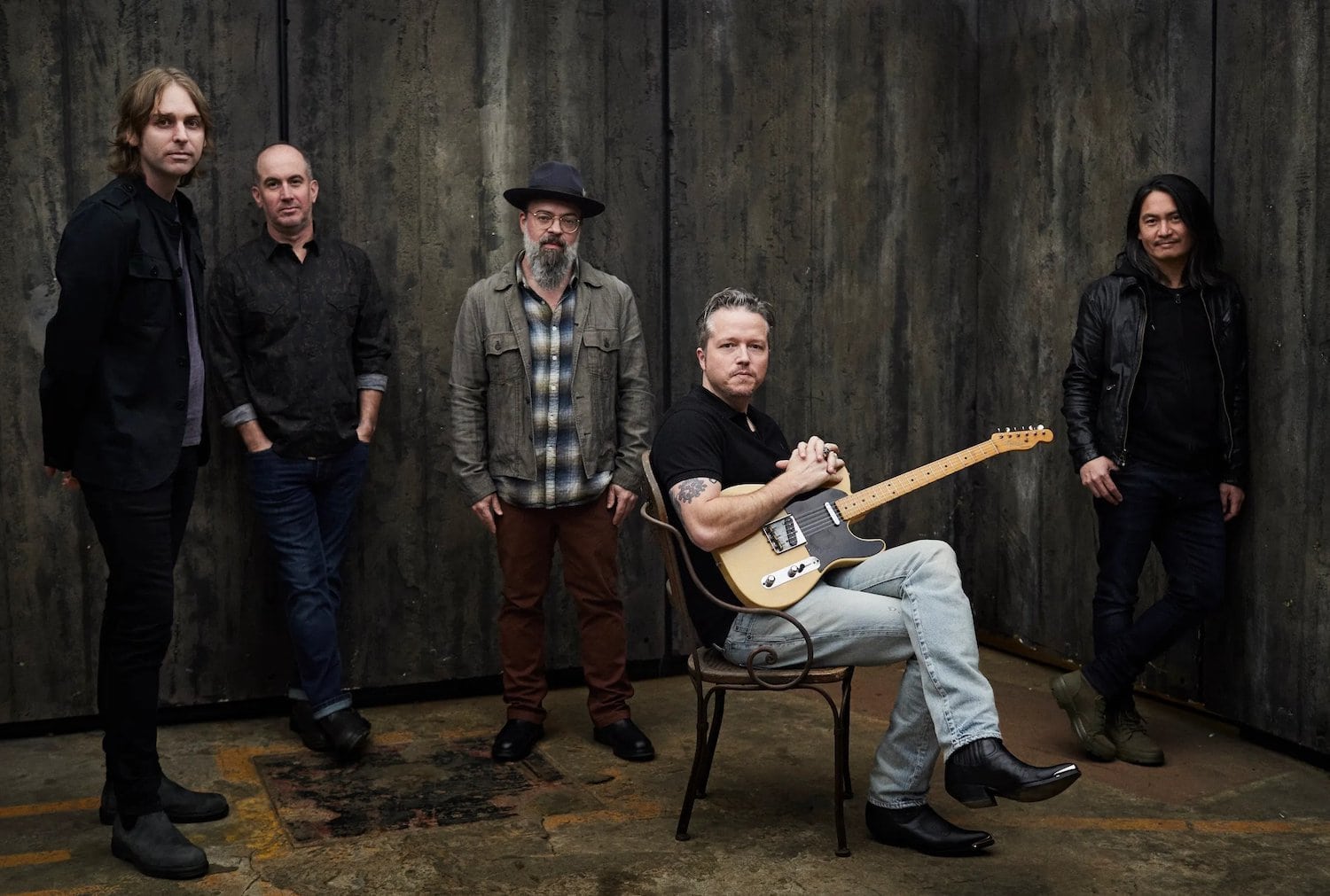Jason Isbell seems to have intended the self-produced Weathervanes as a long-overdue showcase for the 400 Unit as an ensemble. Freed from the strictures of longtime producer Dave Cobb’s trademark warm-and-mellow style, the band covers more ground than ever on their sixth studio album, from the moody ’80s-style jangle-pop of “Save the World” to the hushed folk of “Cast Iron Skillet” to the Crazy Horse-meets-neo-psychedelia of “Miles.”
The musicianship is sparkling throughout, with keyboardist Derry deBorja supplying a dizzying range of background textures while Isbell and guitarist Sadler Vaden similarly flaunt their chops on tracks like “Vestavia Hills.” On “This Ain’t It,” the band struts its way through an upbeat, funky, early-’70s-style classic-rock groove, bongos and all, with effortlessness. What’s more, Isbell himself is in the finest voice of his career, his soulful, husky bellow betraying a new level of desperation and grit on “Death Wish” and accessing depths of tender emotion on “Cast Iron Skillet” and “White Beretta.” And he does a mean Jagger impression on “This Ain’t It.”
But Weathervanes is also the least consistent Isbell album in nearly 15 years. For one, the stylistic divergence and jammy looseness of “This Ain’t It” and “Miles” are too few and far between. On 2021’s Georgia Blue, the 400 Unit got to show off the full breadth of their eclecticism, covering everyone from Otis Redding to Cat Power. Here, all they have to work with are, by and large, the most banal batch of Jason Isbell songs we’ve heard in some time.
As powerful a lyricist as anyone else in Nashville, Isbell has penned a compelling batch of stories for Weathervanes about wounds of the past that continue to fester. But musically, he can’t seem to break out of his usual midtempo wheelhouse often enough to let his band really take flight for more than a few passing moments at a time. At 13 tracks and over an hour of similar tempos and familiar-sounding melodies, the album often feels plodding and redundant, despite all the expert musical coloring. Its few stylistic swerves only serve to underscore the overly familiar trappings of songs like the finger-picked love song “Strawberry Woman.”

Cobb’s absence may have given Isbell and the 400 Unit license to branch out, but considering such finely pruned efforts as 2017’s The Nashville Sound, he seems to have served as a voice of temperance for the group in the past. Without him, we’re left with efforts like “When We Were Close,” a token heavy rocker that lumbers along as Isbell and Vaden’s guitars take offbeat chordal stabs at one another without a single instrumental hook ever emerging from the din.
The irony of the album’s gussied-up nature is that its best songs are often the most direct, wherein the arrangements are secondary to Isbell’s singular blend of painfully personal and broadly relatable lyricism. The indelibly soulful ballad “Middle of the Morning” boasts not only a masterfully dynamic vocal performance, with Isbell ranging between a smooth croon and gut-busting power notes, but also an incisive summation of how the isolation life during lockdown exposed fragility in so many. “I know you’re scared of me, I can see it in your smile/Like an unattended child you can’t quite trust,” he laments, a line that likely arose from a suspicion that his wife spent the darker days the pandemic worrying that Isbell might start drinking again.
On “White Beretta,” Isbell recalls a moment from his teen years when he took a girlfriend on a road trip from north Alabama to Memphis to get an abortion. He explores pain and guilt (“If His love is unconditional then why am I so miserable?”), but also tenderness (“I thank you and I’m sorry for what I put you through”), letting the political implications marinate between the lines.
Elsewhere, “Cast Iron Skillet,” a song about how the inherited wisdom some cling to can sometimes prove to be little more than inherited ignorance, rivals Isbell’s “Elephant” and “If We Were Vampires” for heart-wrenching poignancy. The second half of the song is about a young woman whose family disowns her for taking up with a man “with smiling eyes and dark skin,” and as Isbell surmises, “It’s hard to go through life without your daddy by your side.” Isbell may have been thinking of his seven-year-old daughter and what a cruel act it would be to abandon her for such a foolish reason. He does all that with just a few simple words and a wisp of an arrangement that includes spare acoustic strums, with deBorja filling in the gaps on accordion.
Ultimately, then, Weathervanes showcases both the Isbell who can bring the entire world into focus with just a few lines and an acoustic guitar, and the Gibson-toting Isbell with the hot-shit backing band. But he continues to come so close yet so far from reconciling the two.
Since 2001, we've brought you uncompromising, candid takes on the world of film, music, television, video games, theater, and more. Independently owned and operated publications like Slant have been hit hard in recent years, but we’re committed to keeping our content free and accessible—meaning no paywalls or fees.
If you like what we do, please consider subscribing to our Patreon or making a donation.







Of course the album hasn’t been fully released yet so I’ve only heard 4 songs. But they are GREAT. I can’t wait to hear the rest.
Now that the whole thing is out, I trust that you, like me, are NOT AT ALL disappointed :)
Only listened to 3-4 so far, but I’m not being pulled in by the lyrics or sound. Too much repetition in the lyrics, something Jason usually avoids. And no expansion of the music. Feels like midlife crisis.
ill defer to someone who has studied his music, but as a new fan, i am digging it.
As a long-time Truckers/Jason fan, I’m here to tell you … this one is easily the best since Something More Than Free, and I’d say its equal. I won’t say it’s better than Southeastern, but I honestly think it’s close. And “When We Were Close” is an ode to the late Justin Townes Earle, with whom Jason worked with on Earle’s “Harlem River Blues”. It’s a gut-wrenching track for those of us who (also) loved JTE, which is a LOT of Isbell fans. This review is off-base. This is a GREAT Jason Isbell album, and much better than The Nashville Sound or Reunions. Time will prove me right …
I’m not sure I agree Weathervanes is much better than The Nashville Sound or Reunions, but I definitely agree the review is off-base. By almost any standard, the new album is terrific. Jason and his band have set a very high bar for songwriting and performance over several years now, and the songs on Weathervanes do not disappoint.
This is just a crappy review. It’s that simple.
Well, a review is an opinion, which is like an a… well, you know. Having heard the whole album, that’s about all I can say about your opinion. Jason Isbell is brilliant, and this album doesn’t disappoint, IMO.
This is Isbell & The 400 Unit’s best record since Here We Rest. I love all his stuff but those early records contain some of my favorites.
I could’ve done without Death Wish as the first track but it’s just a solid listen from front to back.
Terrible review but at least Mr. Winograd did find a partner on that white stripes message board, all those years ago…………………….
Love Jason, the band and what they do. Absolutely supreme quality songwriting and lyrics. Yet I agree with the reviewer here in that the album overall is missing the quality control of an independent producer. For those who disagree, just imagine what this album could have been with Dave Cobb overseeing the production and then you’ll better appreciate what the reviewer has said here.